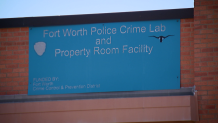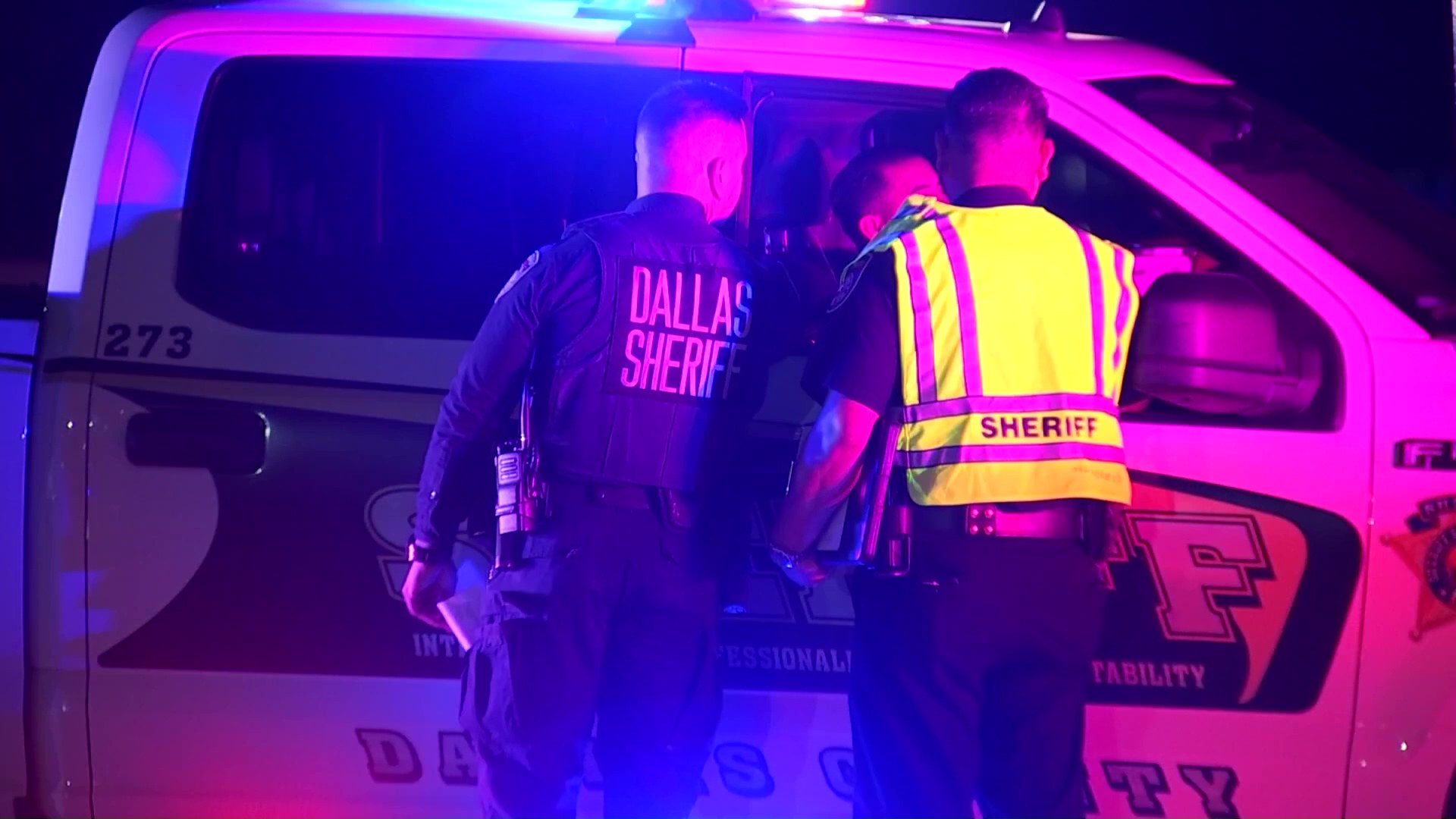The Fort Worth Police Department has failed hundreds of times to test sexual assault evidence kits in the amount of time required by state law, NBC 5 Investigates has learned, raising serious questions about how the department handles the cases and how delays could impact victims.
In 2019, Texas passed a law to eliminate a statewide backlog of untested rape kits. The law, known as HB 8, set strict timelines for police and crime labs to process the kits. However, records obtained by NBC 5 Investigates show that five years later, the Fort Worth Police Department left victims in limbo, missing deadlines by months or even years.
Latrice Godfrey reported that she was raped in a parking lot by someone she knew who offered her a ride home after a night out celebrating a friend's birthday. Godfrey's family took her to a Fort Worth hospital for a sexual assault examination, and she met with detectives and prosecutors who eventually obtained a grand jury indictment against the man accused of assaulting her. But as her case moved forward, she wondered about the status of a key piece of physical evidence.
"I didn't know what a rape kit is or what it would do," said Godfrey. "So I said, 'Hey, did they test my kit?' She said, 'No, not yet.' I'm like, 'Hmmm. OK. Is this normal?'
Get top local stories in DFW delivered to you every morning. Sign up for NBC DFW's News Headlines newsletter.
Godfrey told NBC 5 Investigates she would periodically check the state's online "Track It" system, where victims can check the status of a rape kit. Eleven months after she reported the assault, the state's system said Godfrey's kit still hadn't been processed.

Under state law, the Fort Worth Police Department should have submitted the kit to a lab within 30 days of receiving it, and the lab must then complete the testing within 90 days. However, state records obtained by NBC 5 Investigates show that Fort Worth police have frequently failed to meet those deadlines over the last five years. Out of more than 1,700 kits collected, 767 arrived late at the lab, meaning police missed the 30-day deadline 43% of the time, 412 were submitted more than 100 days late, and 28 were submitted more than a year late.
NBC 5 Investigates
Uncover. Reveal. Expose.
Hundreds of the kits were also not tested in the lab within the required 90-day window. Records the Texas Department of Public Safety provided NBC 5 Investigates showed that, as of October 4th, Fort Worth police had 901 kits awaiting testing that had already passed the 90-day deadline.
"It takes so much to come forward. It takes so much to go through that exam for it to be mishandled and just to be sitting on a shelf like, 'We get to it when we get to it,' when my healing journey is relying on that," Godfrey said.
Fort Worth appears to be the only police department in Texas that runs its own forensic biology lab. So how does a department that can do its own testing miss deadlines hundreds of times? Fort Worth police turned down requests from NBC 5 Investigates to speak with lab staff and instead directed us to Public Information Officer Sgt. Leah Wagner.
Wagner told NBC 5 Investigates the police department is outsourcing lab work because they can't test all of the rape cases on their own. Wagner said, like many other labs across the state, Fort Worth has struggled to hire forensic scientists who can conduct DNA testing. She said the police department's lab has room for eight employees but currently only has three spots that are filled, and only one of those employees can process tests on their own. The other two employees are still completing their training, which can take two years.

The department said the lab was so short-staffed that it was unable to conduct any rape kit testing for seven months in 2021, creating an even bigger backlog.
Wagner added the department also had difficulty finding private labs willing to accept enough kits to clear their backlog.
"If they've cut you off, how are you going to send them? If they've said 'No more,' where do you send them? If they tell you 'No more'?" Wagner said, confirming that outside labs are part of the problem but not the department's whole problem.
"Law enforcement should be following the law," said State Rep. Victoria Neave Criado, D-Dallas, who authored the law that set the testing guidelines. Neave Criado said the state has made tens of millions of dollars available to police departments so they can send rape kits to private labs and clear backlogs.
"The funding is there. There is no excuse for a rape kit to not be timely submitted and tested," Neave Criado said.
Lavinia Masters knows how delays in testing can lead to justice being denied. HB 8, the law introduced by Neave Criado was named after Masters, who was sexually assaulted in Dallas when she was 13 years old.
"You know, those are people. Those are not just kits," Masters said.
Masters' rape kit sat on a shelf for 21 years. By the time her attacker was identified, the statute of limitations had run out.

"We cannot have that mindset that these kits are so old that they don't matter. These victims matter," Masters said.
During our interview with the Fort Worth Police Department, they suggested victims who want their kit tested on time should repeatedly call the department and ask for testing.
"The more that you come forward and say, 'Hey, I need to know this,' the more it lets that detective know, 'Hey, this person, we really need to, to push forward,'" Wagner said.
When asked if a victim should have to beg the police department to adhere to state law and test their rape kit, Wagner said the test will be done regardless, even if it's done a little later in the backlog.
"A department that delays is helping a rapist," Neave Criado said. "A department that delays is impacting a rape survivor."
Neave Criado said the state needs to create incentive programs to help labs recruit and retain more DNA analysts. However, she also said city leaders need to use funding that is already available to seek out more private labs to help clear their backlog.
Fort Worth police told NBC 5 Investigates they are trying to identify additional labs but could not estimate when they might clear their backlog of kits.
"We care about our victims. We care about everybody. We are hampered by the tools that we're being given or not given," Wagner said.

Godfrey said the delay in testing her kit made her feel like the police didn't care about her and that it shattered the trust she had in the justice system.
Prosecutors eventually dropped the charges against the suspect in her case one day after the man's attorney argued his client was being denied the right to a speedy trial. The Tarrant County District Attorney's Office told NBC 5 Investigates testing delays were not a factor in what they said was a "difficult decision" to drop the case after "careful consideration" of all of the evidence.
Still, Godfrey wonders if the delay played a role in the case being dropped, and she's speaking out, hoping the police will process future evidence within the time required by state law.
"I would appreciate that no one behind me will have to go through what I am going through," Godfrey said.
Forensic labs across the state told NBC 5 Investigates that the industry is experiencing a hiring crisis. Some labs said they need better funding to boost salaries and to attract and keep staff.
While the Fort Worth Police Department appears to have one of the largest backlogs in the state, they are not the only department missing testing deadlines. The federal government has spent more than $1 billion to help speed testing, but a report by the nonpartisan data center USA Facts found in 2022, there were 30 states with a combined backlog of more than 25,000 rape kits.
Reporting across our NBC network of owned television stations has also found, across the country, in every major city where the stations obtained records, nine out of 10 sex assault cases never result in a conviction. Testing delays are sometimes a contributing factor to the low conviction rate.
A Texas Senate committee is expected to hold a hearing on Thursday to discuss the testing backlog. NBC 5 Investigates will be watching to see what they say, and we'll have details in a future report.
If you are a survivor of sexual assault who experienced delays in testing, NBC 5 would like to hear your story. You can contact our investigative team at Investigate@nbcdfw.com
SEXUAL ASSAULT VICTIM RESOURCES
If you are a survivor or know of a survivor in need of professional assistance, there are resources available in the community. Here is a list of organizations that may be able to assist:
National Sexual Assault Hotline (RAINN)
- Website: RAINN.org
- Hotline: 1-800-656-HOPE (4673)
- Offers 24/7 confidential support for survivors of sexual assault.
Texas Association Against Sexual Assault (TAASA)
- Website: taasa.org
- A resource for sexual assault survivors and advocates, offering legal support, training, and community-based programs.
- Website: texasadvocacyproject.org
Dallas Area Rape Crisis Center (DARCC)
- Website: dallasrapecrisis.org
- Provides advocacy, counseling, and legal assistance for survivors of sexual assault in the Dallas area.
Texas Legal Services Center
- Website: tlsc.org
- Provides pro bono legal services to victims of sexual assault, including help with protective orders and other legal matters.
Victim Support Services - Texas Department of Public Safety
- Website: dps.texas.gov
- Helps crime victims access compensation for medical expenses, lost wages, and other costs related to sexual assault.
The Women's Center
- Website: womenscentertc.org
- Hotline: 817-927-2737
- Offers hospital accompaniment for survivors of sexual assault and other violent crimes, counseling, assistance through the criminal justice process and legal services for sexual assault victims.
Safe Horizon
- Website: safehorizon.org
- Hotline: 1-800-621-HOPE (4673)
- Offers crisis counseling, support groups, and legal assistance.
End Rape on Campus (EROC)
- Website: endrapeoncampus.org
- Supports survivors of sexual violence in educational institutions and offers resources for reporting incidents.
National Center for Victims of Crime (NCVC)
- Website: victimsofcrime.org
- Provides information and resources for victims of crime, including sexual assault.
Futures Without Violence
- Website: futureswithoutviolence.org
- Offers programs and resources aimed at ending violence against women and children.
The Joyful Heart Foundation
- Website: joyfulheartfoundation.org
- A nonprofit organization offering support, education, and advocacy for survivors of sexual assault, domestic violence, and child abuse.



